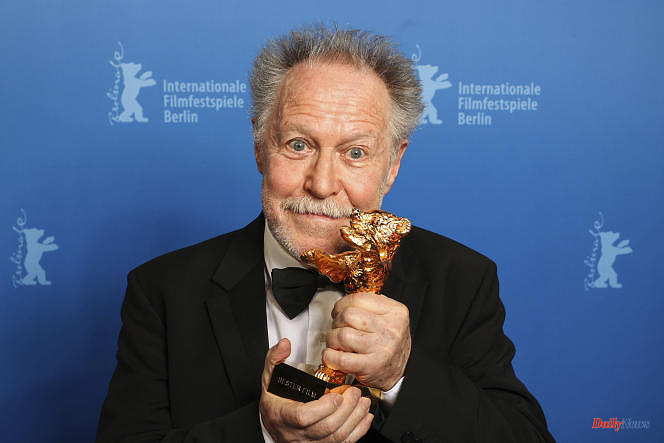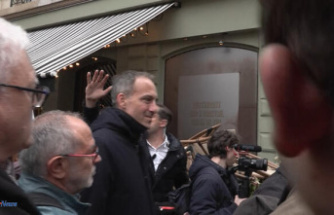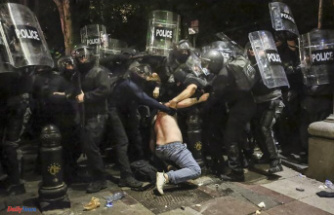It's a documentary that won the Golden Bear at the Berlin Film Festival on Saturday, February 25. "Sur l'Adamant" is "an attempt to overturn the image we have of people with madness," said Frenchman Nicolas Philibert, receiving his award. Two decades after the immense success of "Being and Having", the 72-year-old documentary filmmaker left school for this dive into the psychiatric universe, the first film of a trilogy on this subject. “Sur l’Adamant”, which comes out on March 22 in France, is a documentary about a Parisian barge accommodating people with mental disorders.
Without voice-over, scrutinizing the faces of the patients welcomed every day in this unique structure where great freedom is left to them. "The craziest people are not the ones you think," added the director of this long-running documentary, in which the line between caregivers and patients ends up blurring. We can see patients participating in therapeutic or artistic workshops, but also forgetting their sick status to build a common life, helping for example to control the budget.
Documentaries are regularly selected in major international film competitions, but rarely win awards. Last year, the Venice Film Festival awarded its Golden Lion to a film about the opiate crisis in the United States, directed by Laura Poitras (“All the beauty and the bloodshed”).
"This festival is here to push the boundaries," said American actress Kristen Stewart, who at 32 was the youngest jury president in the festival's history. "The invisible parameters forged by industry and academism about what a movie is don't stand a chance with this one," she added before presenting the award.
The Silver Bear for Frenchman Philippe Garrel
Another Frenchman, Philippe Garrel, 74, received the Silver Bear for best director for "Le Grand Chariot", a film that looks like an artistic testament shot with his children, the most famous of whom, his son Louis, actor and director. "Long live the Iranian revolution", declared this heir to the New Wave while receiving his prize which he also dedicated "to Jean-Luc Godard, who is [...] a very great master, who is no longer this world,” died in September.
Philippe Garrel swears that he did not want to make an "autofiction" with "Le Grand Chariot", even if the film depicts his own family in an almost transparent way and questions the idea of artistic heritage and success. Louis Garrel, the eldest, plays under his own name, as does his half-sister Léna, while his other sister Esther has chosen to be called Martha in the film. They play the children of a puppeteer, a profession exercised by Philippe Garrel's own father before becoming an actor.
On the death of the puppeteer, each child will make his own artistic choices or not, Louis flying on his own and becoming a well-known actor while his sisters prefer to take over the family puppet theatre. It is the destiny of all artists to have the chance or not on their side, "explained Philippe Garrel, interviewed by Agence France-Presse during the festival in Berlin. "There are talented people who succeed, talented people who fail, untalented people who succeed and untalented people who fail," he added.
Returning to normality, after the restrictions linked to the Covid
The jury, which also included the former holders of the Golden Bear Radu Jude and Carla Simon, or the French-Iranian actress Golshifteh Farahani, also rewarded the performance of an 8-year-old girl, the Spaniard Sofia Otera , for her role in "20,000 especies de abejas" ("20,000 species of bees"). The budding actress received, with tears in her eyes like a grown-up, the prize for best interpretation, which is gender neutral and replaces in Berlin that of best actor or best actress.
In the film, signed by the Spaniard Estíbaliz Urresola, she plays a nine-year-old child, born a boy and who considers himself a girl. The question of gender and transidentity, on which more and more filmmakers are looking, has been present on several occasions in the prize list.
The Austrian Thea Ehre, very active for transsexual rights, received the interpretation award for a secondary character for her role in "Till The End of The Night", and the thinker Paul B. Preciado, a key figure on these questions, was rewarded in the parallel sections for his first film ("Orlando, my political biography").
Beyond the competition, this 73rd edition allowed the Berlinale to return to normality, after the restrictions linked to the Covid, and saw a certain number of stars return. We were able to see Sean Penn, who came to present a documentary on his wanderings in Ukraine at war, the singer Bono and the legendary director Steven Spielberg, who received an honorary Golden Bear. Friday evening, a Teddy Bear (rewarding the best film on an LGBT theme) was awarded to "All the Colors of the World Are Between Black and White", a love story by Nigerian Babatunde Apalowo.












